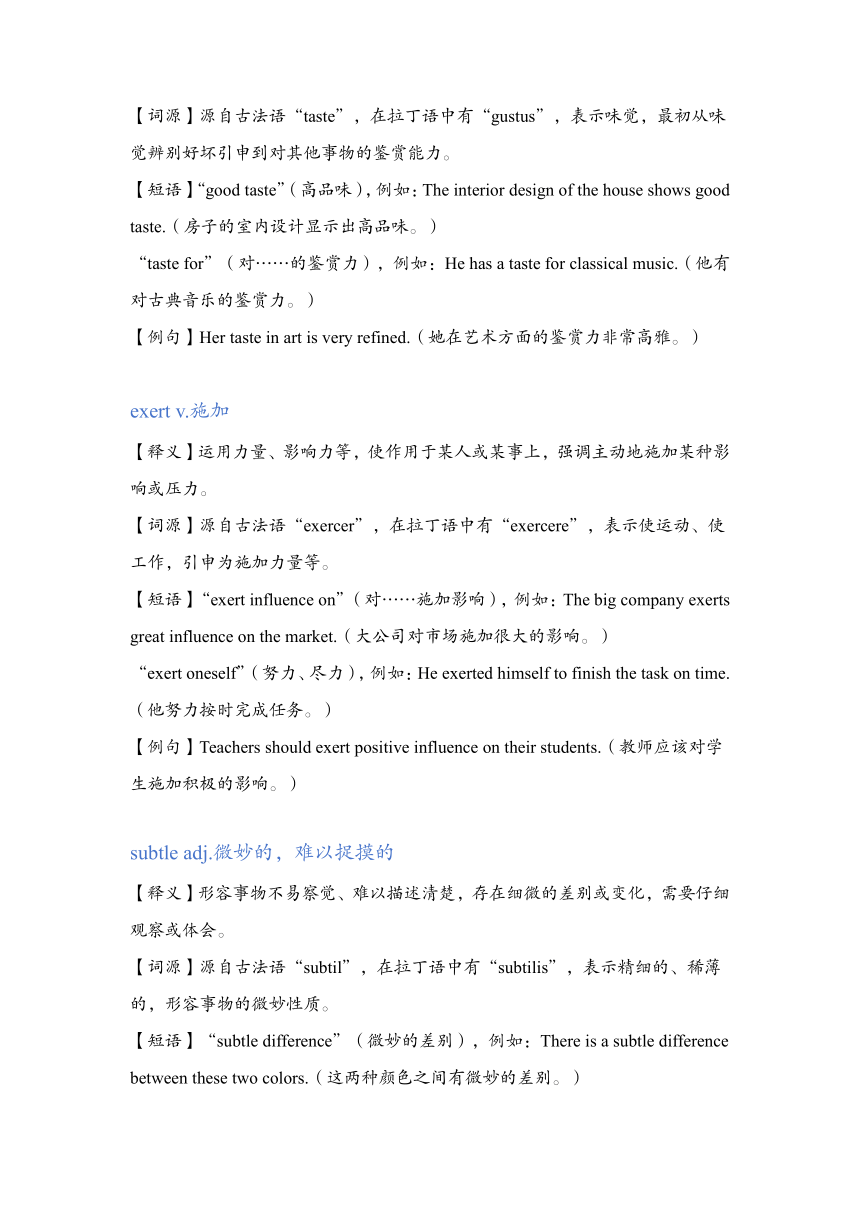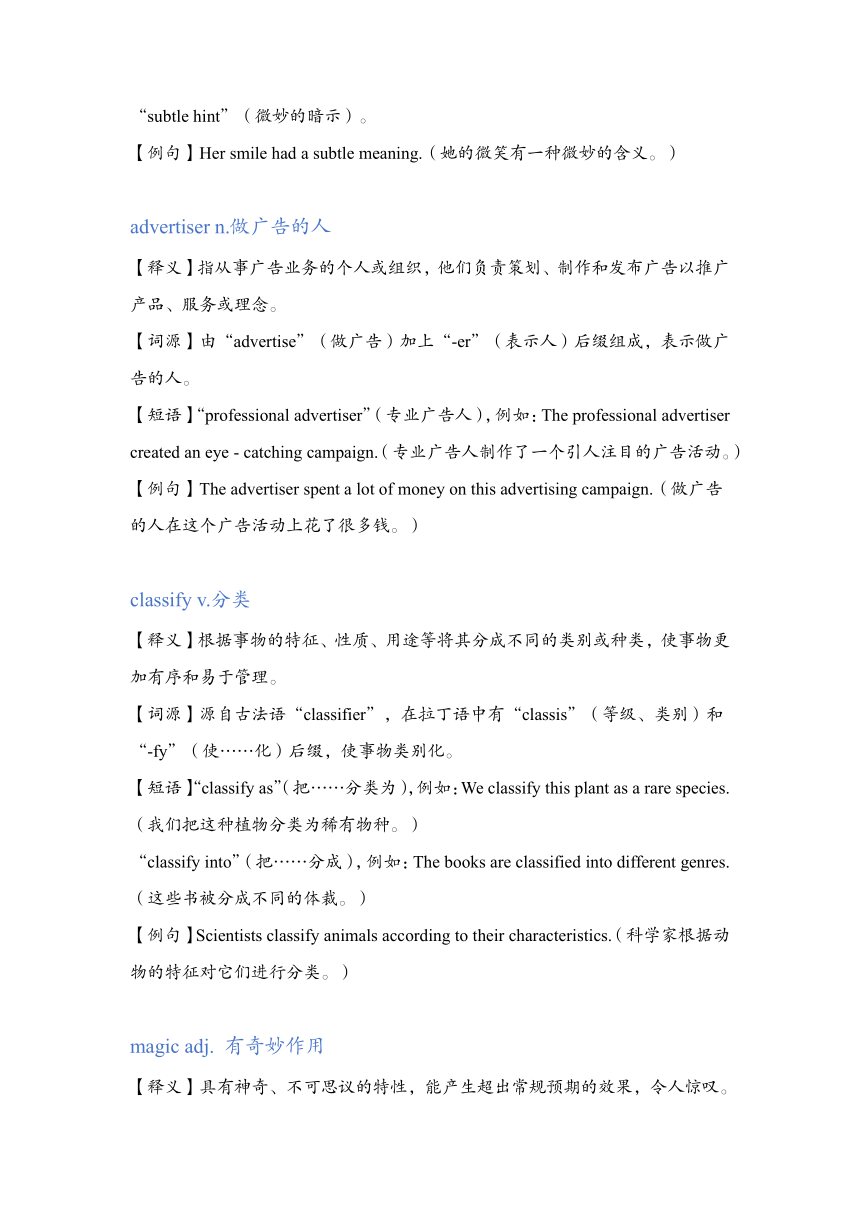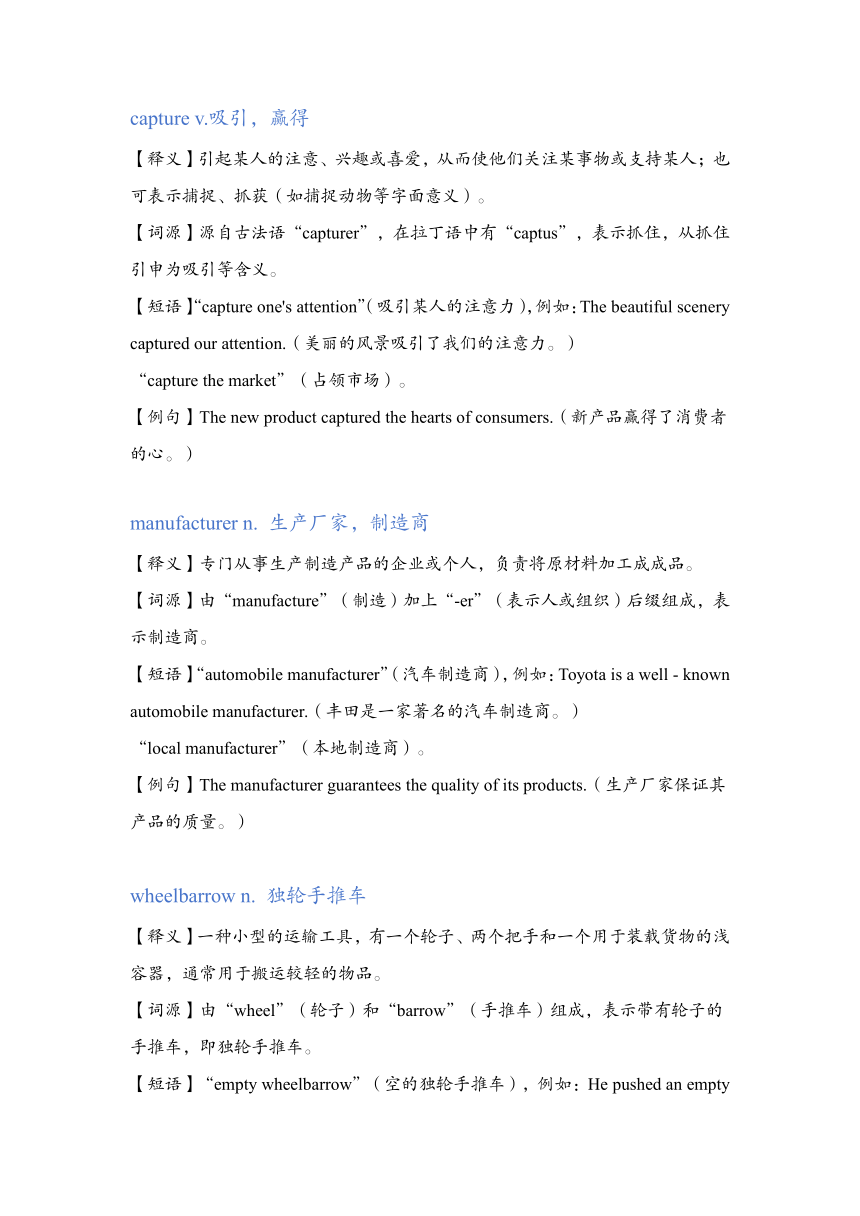新概念第三册Lesson 26 Wanted a large biscuit tin讲义
文档属性
| 名称 | 新概念第三册Lesson 26 Wanted a large biscuit tin讲义 |

|
|
| 格式 | docx | ||
| 文件大小 | 373.7KB | ||
| 资源类型 | 教案 | ||
| 版本资源 | 新概念英语 | ||
| 科目 | 英语 | ||
| 更新时间 | 2024-12-04 00:00:00 | ||
图片预览





文档简介
新概念第三册
Lesson 26 Wanted: a large biscuit tin
单词精讲
influence v.影响
【释义】对人或事物的思想、行为、发展等产生作用,这种作用可以是直接的或间接的、正面的或负面的。
【词源】源自古法语“influencer”,在拉丁语中有“influere”,表示流入,最初表示一种流体(如星力等)流入并影响事物,后泛指影响。
【短语】“influence on”(对……的影响),例如:His words had a great influence on my decision.(他的话对我的决定有很大的影响。)
“be influenced by”(受……影响),例如:She was influenced by her mother's taste in music.(她受母亲音乐品味的影响。)
【例句】The new policy will influence the development of the industry.(新政策将影响这个行业的发展。)
pride v. 骄傲
【释义】以某事或某人而感到自豪、得意,是一种对自身或与自身相关事物的积极评价所产生的情感。
【词源】源自古英语“pridian”,在日耳曼语族中有类似表示自傲的词汇,表达对自身价值、成就等的高度认可。
【短语】“pride oneself on”(为……而自豪),例如:He prides himself on his excellent cooking skills.(他为自己出色的烹饪技巧而自豪。)
【例句】She prides in her son's achievements.(她为儿子的成就而骄傲。)
taste n. 鉴赏力
【释义】指个人对艺术、美食、时尚等事物的审美能力和鉴别能力,能够区分好坏、高低等不同品质。
【词源】源自古法语“taste”,在拉丁语中有“gustus”,表示味觉,最初从味觉辨别好坏引申到对其他事物的鉴赏能力。
【短语】“good taste”(高品味),例如:The interior design of the house shows good taste.(房子的室内设计显示出高品味。)
“taste for”(对……的鉴赏力),例如:He has a taste for classical music.(他有对古典音乐的鉴赏力。)
【例句】Her taste in art is very refined.(她在艺术方面的鉴赏力非常高雅。)
exert v.施加
【释义】运用力量、影响力等,使作用于某人或某事上,强调主动地施加某种影响或压力。
【词源】源自古法语“exercer”,在拉丁语中有“exercere”,表示使运动、使工作,引申为施加力量等。
【短语】“exert influence on”(对……施加影响),例如:The big company exerts great influence on the market.(大公司对市场施加很大的影响。)
“exert oneself”(努力、尽力),例如:He exerted himself to finish the task on time.(他努力按时完成任务。)
【例句】Teachers should exert positive influence on their students.(教师应该对学生施加积极的影响。)
subtle adj.微妙的,难以捉摸的
【释义】形容事物不易察觉、难以描述清楚,存在细微的差别或变化,需要仔细观察或体会。
【词源】源自古法语“subtil”,在拉丁语中有“subtilis”,表示精细的、稀薄的,形容事物的微妙性质。
【短语】“subtle difference”(微妙的差别),例如:There is a subtle difference between these two colors.(这两种颜色之间有微妙的差别。)
“subtle hint”(微妙的暗示)。
【例句】Her smile had a subtle meaning.(她的微笑有一种微妙的含义。)
advertiser n.做广告的人
【释义】指从事广告业务的个人或组织,他们负责策划、制作和发布广告以推广产品、服务或理念。
【词源】由“advertise”(做广告)加上“-er”(表示人)后缀组成,表示做广告的人。
【短语】“professional advertiser”(专业广告人),例如:The professional advertiser created an eye - catching campaign.(专业广告人制作了一个引人注目的广告活动。)
【例句】The advertiser spent a lot of money on this advertising campaign.(做广告的人在这个广告活动上花了很多钱。)
classify v.分类
【释义】根据事物的特征、性质、用途等将其分成不同的类别或种类,使事物更加有序和易于管理。
【词源】源自古法语“classifier”,在拉丁语中有“classis”(等级、类别)和“-fy”(使……化)后缀,使事物类别化。
【短语】“classify as”(把……分类为),例如:We classify this plant as a rare species.(我们把这种植物分类为稀有物种。)
“classify into”(把……分成),例如:The books are classified into different genres.(这些书被分成不同的体裁。)
【例句】Scientists classify animals according to their characteristics.(科学家根据动物的特征对它们进行分类。)
magic adj. 有奇妙作用
【释义】具有神奇、不可思议的特性,能产生超出常规预期的效果,令人惊叹。
【词源】源自古法语“magique”,在希腊语中有“magikos”,与魔法、巫术有关,引申为有奇妙作用。
【短语】“magic effect”(神奇的效果),例如:The new medicine has a magic effect on treating this disease.(这种新药在治疗这种疾病上有神奇的效果。)
“magic touch”(神奇的手法)。
【例句】The magician's performance was full of magic moments.(魔术师的表演充满了神奇的时刻。)
sample n.样品
【释义】指从整体中抽取出来的一小部分,用于代表整体的性质、特征等,可用于检验、展示或试用等目的。
【词源】源自古法语“essample”,在拉丁语中有“exemplum”,表示例子、范例,后来用于表示样品。
【短语】“product sample”(产品样品),例如:The company sent out product samples to potential customers.(公司向潜在客户发送产品样品。)
“sample size”(样本量)。
【例句】The scientist analyzed the sample carefully.(科学家仔细分析了样品。)
devise v.设计,想出
【释义】通过思考、创新等方式创造或计划出某种东西(如方法、方案、装置等)。
【词源】源自古法语“deviser”,在拉丁语中有“divisus”,表示分开、划分,最初表示将事物分开来构思,后指设计、想出。
【短语】“devise a plan”(设计一个计划),例如:They devised a new marketing plan.(他们设计了一个新的营销计划。)
“devise a method”(想出一种方法)。
【例句】The engineer devised a new machine to improve efficiency.(工程师设计出一种新机器来提高效率。)
capture v.吸引,赢得
【释义】引起某人的注意、兴趣或喜爱,从而使他们关注某事物或支持某人;也可表示捕捉、抓获(如捕捉动物等字面意义)。
【词源】源自古法语“capturer”,在拉丁语中有“captus”,表示抓住,从抓住引申为吸引等含义。
【短语】“capture one's attention”(吸引某人的注意力),例如:The beautiful scenery captured our attention.(美丽的风景吸引了我们的注意力。)
“capture the market”(占领市场)。
【例句】The new product captured the hearts of consumers.(新产品赢得了消费者的心。)
manufacturer n. 生产厂家,制造商
【释义】专门从事生产制造产品的企业或个人,负责将原材料加工成成品。
【词源】由“manufacture”(制造)加上“-er”(表示人或组织)后缀组成,表示制造商。
【短语】“automobile manufacturer”(汽车制造商),例如:Toyota is a well - known automobile manufacturer.(丰田是一家著名的汽车制造商。)
“local manufacturer”(本地制造商)。
【例句】The manufacturer guarantees the quality of its products.(生产厂家保证其产品的质量。)
wheelbarrow n. 独轮手推车
【释义】一种小型的运输工具,有一个轮子、两个把手和一个用于装载货物的浅容器,通常用于搬运较轻的物品。
【词源】由“wheel”(轮子)和“barrow”(手推车)组成,表示带有轮子的手推车,即独轮手推车。
【短语】“empty wheelbarrow”(空的独轮手推车),例如:He pushed an empty wheelbarrow to the garden.(他推着一辆空的独轮手推车去花园。)
【例句】The farmer used a wheelbarrow to carry the vegetables.(农民用独轮手推车搬运蔬菜。)
boot n. (汽车尾部的)行李箱
【释义】在汽车上,指位于车尾用于存放行李、物品的空间部分。
【词源】源自古英语“bōt”,最初表示一种保护腿部的长筒靴形状的东西,在汽车中引申为车尾行李箱的形状类似长筒靴,所以得名。
【短语】“open the boot”(打开行李箱),例如:He opened the boot to put his suitcase in.(他打开行李箱把他的手提箱放进去。)
【例句】There is not enough space in the boot for all the shopping.(行李箱里没有足够的空间放所有的购物物品。)
ingredient n.配料
【释义】指用于制作食品、药品、化学品等混合物中的一种成分,是构成整体的部分之一。
【词源】源自古法语“ingrédient”,在拉丁语中有“ingrediens”,表示进入的、构成的,用于描述构成事物的成分。
【短语】
“main ingredient”(主要配料),例如:Flour is the main ingredient in making bread.(面粉是制作面包的主要配料。)
“secret ingredient”(秘密配料)。
【例句】The recipe lists all the ingredients you need.(这个食谱列出了你需要的所有配料。)
crane n.起重机
【释义】一种大型机械设备,通常用于在建筑工地、港口等场所吊起和移动重物。
【词源】源自古英语“cran”,在日耳曼语族中有类似表示起重机这种形状的词汇,因其形状类似鹤(crane也有鹤的意思)而得名。
【短语】“tower crane”(塔式起重机),例如:The tower crane is used to build high - rise buildings.(塔式起重机用于建造高层建筑。)
“mobile crane”(移动式起重机)。
【例句】The crane lifted the heavy steel beam.(起重机吊起了沉重的钢梁。)
anticipate v.预期,预料
【释义】事先预见或期待某事将会发生,通常是基于经验、知识或对形势的分析。
【词源】源自古拉丁语“anticipare”,有提前拿取、预先做的意思,引申为预期、预料。
【短语】“anticipate problems”(预料问题),例如:The project manager anticipated problems before they occurred.(项目经理在问题发生之前就预料到了。)
“anticipate one's arrival”(预料某人的到来)。
【例句】We anticipate a great success for this new product.(我们预期这个新产品会取得巨大成功。)
二、课文精讲
1.No one can avoid being influenced by advertisements.没有人能避免受广告的影响。
No avoid构成双重否定句。
在本册的第18课中也出现过双重否定句:
Even people who take no interest in art cannot have failed to notice examples of modern sculpture on display in public places.take no interest……cannot就是双重否定的结构。
2.Much as we may pride ourselves on our good taste, we are no longer free to choose the things we want, for advertising exerts a subtle influence on us.尽管我们可以自夸自己的鉴赏力如何敏锐,但我们已经无法独立自主地选购自己所需的东西了。
Much as we引导让步状语从句,as引导时,句子要倒装。
3.In their efforts to persuade us to buy this or that product, advertisers have made a close study of human nature and have classified all our little weaknesses.做广告的人在力图劝说我们买下这种产品或那种产品之前,已经仔细地研究了人的本性,并把人的弱点进行了分类。
In their efforts to do sth,为了……相当于in order to do sth.
In order to keep your insurance rates down, it is important to keep your driving record as clean as possible. 要保证自己无违规驾驶,这点很重要,这样一来你的保险费率就会降下来。
He finally left home in an effort to counter the tyranny of arranged marriage in the old society.他弃家出走,是对旧社会婚姻压迫的反动。
4.These days, advertisers not only offer free samples,but free cars, free houses, and free trips round the world as well.目前,做广告的人不仅提供免费样品,而且还提供免费汽车,免费住房,免费周游世界。
not only but also的省略形式。but also有几种变体:but also的变体形式:
a: 省去also,只留but;
b: 省去but,只留also;
c: but…as well;d: but also全部省略。
(1) Scarlett quaked lest she and Frank lose not only their freedom but the house,the store and mill. 斯佳丽害怕得发抖,惟恐她与弗兰克不仅会失去自由,而且还会失去房屋、商店及锯木厂。
(2) She's not only an excellent housewife also a first class mathematician. 她不仅是一个出色的家庭主妇,而且是一位一流的数学家。
(3) Not only does he write the words to the songs,but he composes the music as well. 他不仅给歌曲写词,也谱曲。
(4) Such a change would improve not only his social image but his health as well. 这样的变化不仅会提高他的社会形象,而且会改善他的健康。
(5) Not only did I hear the car,I actually saw it crash. 我不仅听见了车的声音,而且还亲眼看见了那辆车撞坏了。
5.Radio and television have made it possible for advertisers to capture the attention of millions of people in this way.电台、电视使做广告的人可以用这种手段吸引成百万人的注意力。
make for sb to do sth宾语补足语
6.Before long, biscuits of all shapes and sizes began arriving at the factory.不久,形状各异,大小不一的饼干陆续送到工厂。
before long不久
They're bound to catch him before long.不久,他们一定会抓到他。
7.A little later, a man came along with a biscuit which occupied the whole boot of his car.相隔不一会儿,一个男子也带来一个大饼干,那个饼干把汽车的行李箱挤得满满的。
along with与……一起
Students can use this map, along with a map from prewar Europe, to draw a comparison map.同学们可以根据这张地图和战前的欧洲地图,做出一张对比地图来。
8.It was so heavy that a crane had to be used to remove it from the lorry.饼干份量太重了,用了一台起重机才把它从卡车上卸下。
so……that引导结果状语从句,so后可接形容词或副词。
9.Much as we may pride ourselves on our good taste, we are no longer free to choose thethings we want, for advertising exerts a subtle influence on us.
as让步状语从句
例句:
Slowly as the tortoise walked,he beat the hare.
尽管乌龟走得很慢,但它仍能打败兔子。
Hard as she worked, she seemed not to do the job well.
尽管她很努力,但她似乎总不能把工作做得很漂亮。
as引导让步状语从句时,状语表语及谓语动词的一部分置于as之前,且表语中的冠词要省略。
如:Try as we did we failed again.又如:Late as he came he saw the famous man.而although则无此种用法,句中although应改为 as.
as引导让步状语从句时,常放在作表语,状语或谓语的一部分的形容词,名词,副词或动词原形之后.如果是单数名词或形容词的最高级作表语,不再用冠词.
however和as 引导让步状语从句时的区别:
however引导让步状语从句时,相当于no matter how,后面跟形容词或副词;as引导让步状语从句时,用倒装语序,即把作状语的副词或作表语的形容词或名词提前,而且如果作表语的是单数名词,前面不加冠词,也可以把谓语动词部分的实义动词提前。
〔误〕 As hard he works, he can’t catch up with his classmates.
〔正〕 However hard he works, he can’t catch up with his classmates.
〔析〕见上述说明。
【经典句子】
1).Much as we may pride ourselves on our good taste, we are no longer free to choose thethings we want, for advertising exerts a subtle influence on us.尽管我们可以自夸自己的鉴赏力如何敏锐,但我们已经无法独立自主地选购自己所需的东西了。这是因为广告在我们身上施加着一种潜移默化的影响。
2).Advertisers discovered yearsago that all of us love to get something for nothing.广告商在很多年以前就发现,我们大家都喜欢不花钱得到的东西。
3).The response to thiscompetition was tremendous.这次竞赛在听众中引起极其热烈的反响。
4).A little later, a man camealong with a biscuit which occupied the wholeboot of his car.相隔不一会儿,一个男子也带来一个大饼干,那个饼干把汽车的行李箱挤得满满的。
Lesson 26 Wanted: a large biscuit tin
单词精讲
influence v.影响
【释义】对人或事物的思想、行为、发展等产生作用,这种作用可以是直接的或间接的、正面的或负面的。
【词源】源自古法语“influencer”,在拉丁语中有“influere”,表示流入,最初表示一种流体(如星力等)流入并影响事物,后泛指影响。
【短语】“influence on”(对……的影响),例如:His words had a great influence on my decision.(他的话对我的决定有很大的影响。)
“be influenced by”(受……影响),例如:She was influenced by her mother's taste in music.(她受母亲音乐品味的影响。)
【例句】The new policy will influence the development of the industry.(新政策将影响这个行业的发展。)
pride v. 骄傲
【释义】以某事或某人而感到自豪、得意,是一种对自身或与自身相关事物的积极评价所产生的情感。
【词源】源自古英语“pridian”,在日耳曼语族中有类似表示自傲的词汇,表达对自身价值、成就等的高度认可。
【短语】“pride oneself on”(为……而自豪),例如:He prides himself on his excellent cooking skills.(他为自己出色的烹饪技巧而自豪。)
【例句】She prides in her son's achievements.(她为儿子的成就而骄傲。)
taste n. 鉴赏力
【释义】指个人对艺术、美食、时尚等事物的审美能力和鉴别能力,能够区分好坏、高低等不同品质。
【词源】源自古法语“taste”,在拉丁语中有“gustus”,表示味觉,最初从味觉辨别好坏引申到对其他事物的鉴赏能力。
【短语】“good taste”(高品味),例如:The interior design of the house shows good taste.(房子的室内设计显示出高品味。)
“taste for”(对……的鉴赏力),例如:He has a taste for classical music.(他有对古典音乐的鉴赏力。)
【例句】Her taste in art is very refined.(她在艺术方面的鉴赏力非常高雅。)
exert v.施加
【释义】运用力量、影响力等,使作用于某人或某事上,强调主动地施加某种影响或压力。
【词源】源自古法语“exercer”,在拉丁语中有“exercere”,表示使运动、使工作,引申为施加力量等。
【短语】“exert influence on”(对……施加影响),例如:The big company exerts great influence on the market.(大公司对市场施加很大的影响。)
“exert oneself”(努力、尽力),例如:He exerted himself to finish the task on time.(他努力按时完成任务。)
【例句】Teachers should exert positive influence on their students.(教师应该对学生施加积极的影响。)
subtle adj.微妙的,难以捉摸的
【释义】形容事物不易察觉、难以描述清楚,存在细微的差别或变化,需要仔细观察或体会。
【词源】源自古法语“subtil”,在拉丁语中有“subtilis”,表示精细的、稀薄的,形容事物的微妙性质。
【短语】“subtle difference”(微妙的差别),例如:There is a subtle difference between these two colors.(这两种颜色之间有微妙的差别。)
“subtle hint”(微妙的暗示)。
【例句】Her smile had a subtle meaning.(她的微笑有一种微妙的含义。)
advertiser n.做广告的人
【释义】指从事广告业务的个人或组织,他们负责策划、制作和发布广告以推广产品、服务或理念。
【词源】由“advertise”(做广告)加上“-er”(表示人)后缀组成,表示做广告的人。
【短语】“professional advertiser”(专业广告人),例如:The professional advertiser created an eye - catching campaign.(专业广告人制作了一个引人注目的广告活动。)
【例句】The advertiser spent a lot of money on this advertising campaign.(做广告的人在这个广告活动上花了很多钱。)
classify v.分类
【释义】根据事物的特征、性质、用途等将其分成不同的类别或种类,使事物更加有序和易于管理。
【词源】源自古法语“classifier”,在拉丁语中有“classis”(等级、类别)和“-fy”(使……化)后缀,使事物类别化。
【短语】“classify as”(把……分类为),例如:We classify this plant as a rare species.(我们把这种植物分类为稀有物种。)
“classify into”(把……分成),例如:The books are classified into different genres.(这些书被分成不同的体裁。)
【例句】Scientists classify animals according to their characteristics.(科学家根据动物的特征对它们进行分类。)
magic adj. 有奇妙作用
【释义】具有神奇、不可思议的特性,能产生超出常规预期的效果,令人惊叹。
【词源】源自古法语“magique”,在希腊语中有“magikos”,与魔法、巫术有关,引申为有奇妙作用。
【短语】“magic effect”(神奇的效果),例如:The new medicine has a magic effect on treating this disease.(这种新药在治疗这种疾病上有神奇的效果。)
“magic touch”(神奇的手法)。
【例句】The magician's performance was full of magic moments.(魔术师的表演充满了神奇的时刻。)
sample n.样品
【释义】指从整体中抽取出来的一小部分,用于代表整体的性质、特征等,可用于检验、展示或试用等目的。
【词源】源自古法语“essample”,在拉丁语中有“exemplum”,表示例子、范例,后来用于表示样品。
【短语】“product sample”(产品样品),例如:The company sent out product samples to potential customers.(公司向潜在客户发送产品样品。)
“sample size”(样本量)。
【例句】The scientist analyzed the sample carefully.(科学家仔细分析了样品。)
devise v.设计,想出
【释义】通过思考、创新等方式创造或计划出某种东西(如方法、方案、装置等)。
【词源】源自古法语“deviser”,在拉丁语中有“divisus”,表示分开、划分,最初表示将事物分开来构思,后指设计、想出。
【短语】“devise a plan”(设计一个计划),例如:They devised a new marketing plan.(他们设计了一个新的营销计划。)
“devise a method”(想出一种方法)。
【例句】The engineer devised a new machine to improve efficiency.(工程师设计出一种新机器来提高效率。)
capture v.吸引,赢得
【释义】引起某人的注意、兴趣或喜爱,从而使他们关注某事物或支持某人;也可表示捕捉、抓获(如捕捉动物等字面意义)。
【词源】源自古法语“capturer”,在拉丁语中有“captus”,表示抓住,从抓住引申为吸引等含义。
【短语】“capture one's attention”(吸引某人的注意力),例如:The beautiful scenery captured our attention.(美丽的风景吸引了我们的注意力。)
“capture the market”(占领市场)。
【例句】The new product captured the hearts of consumers.(新产品赢得了消费者的心。)
manufacturer n. 生产厂家,制造商
【释义】专门从事生产制造产品的企业或个人,负责将原材料加工成成品。
【词源】由“manufacture”(制造)加上“-er”(表示人或组织)后缀组成,表示制造商。
【短语】“automobile manufacturer”(汽车制造商),例如:Toyota is a well - known automobile manufacturer.(丰田是一家著名的汽车制造商。)
“local manufacturer”(本地制造商)。
【例句】The manufacturer guarantees the quality of its products.(生产厂家保证其产品的质量。)
wheelbarrow n. 独轮手推车
【释义】一种小型的运输工具,有一个轮子、两个把手和一个用于装载货物的浅容器,通常用于搬运较轻的物品。
【词源】由“wheel”(轮子)和“barrow”(手推车)组成,表示带有轮子的手推车,即独轮手推车。
【短语】“empty wheelbarrow”(空的独轮手推车),例如:He pushed an empty wheelbarrow to the garden.(他推着一辆空的独轮手推车去花园。)
【例句】The farmer used a wheelbarrow to carry the vegetables.(农民用独轮手推车搬运蔬菜。)
boot n. (汽车尾部的)行李箱
【释义】在汽车上,指位于车尾用于存放行李、物品的空间部分。
【词源】源自古英语“bōt”,最初表示一种保护腿部的长筒靴形状的东西,在汽车中引申为车尾行李箱的形状类似长筒靴,所以得名。
【短语】“open the boot”(打开行李箱),例如:He opened the boot to put his suitcase in.(他打开行李箱把他的手提箱放进去。)
【例句】There is not enough space in the boot for all the shopping.(行李箱里没有足够的空间放所有的购物物品。)
ingredient n.配料
【释义】指用于制作食品、药品、化学品等混合物中的一种成分,是构成整体的部分之一。
【词源】源自古法语“ingrédient”,在拉丁语中有“ingrediens”,表示进入的、构成的,用于描述构成事物的成分。
【短语】
“main ingredient”(主要配料),例如:Flour is the main ingredient in making bread.(面粉是制作面包的主要配料。)
“secret ingredient”(秘密配料)。
【例句】The recipe lists all the ingredients you need.(这个食谱列出了你需要的所有配料。)
crane n.起重机
【释义】一种大型机械设备,通常用于在建筑工地、港口等场所吊起和移动重物。
【词源】源自古英语“cran”,在日耳曼语族中有类似表示起重机这种形状的词汇,因其形状类似鹤(crane也有鹤的意思)而得名。
【短语】“tower crane”(塔式起重机),例如:The tower crane is used to build high - rise buildings.(塔式起重机用于建造高层建筑。)
“mobile crane”(移动式起重机)。
【例句】The crane lifted the heavy steel beam.(起重机吊起了沉重的钢梁。)
anticipate v.预期,预料
【释义】事先预见或期待某事将会发生,通常是基于经验、知识或对形势的分析。
【词源】源自古拉丁语“anticipare”,有提前拿取、预先做的意思,引申为预期、预料。
【短语】“anticipate problems”(预料问题),例如:The project manager anticipated problems before they occurred.(项目经理在问题发生之前就预料到了。)
“anticipate one's arrival”(预料某人的到来)。
【例句】We anticipate a great success for this new product.(我们预期这个新产品会取得巨大成功。)
二、课文精讲
1.No one can avoid being influenced by advertisements.没有人能避免受广告的影响。
No avoid构成双重否定句。
在本册的第18课中也出现过双重否定句:
Even people who take no interest in art cannot have failed to notice examples of modern sculpture on display in public places.take no interest……cannot就是双重否定的结构。
2.Much as we may pride ourselves on our good taste, we are no longer free to choose the things we want, for advertising exerts a subtle influence on us.尽管我们可以自夸自己的鉴赏力如何敏锐,但我们已经无法独立自主地选购自己所需的东西了。
Much as we引导让步状语从句,as引导时,句子要倒装。
3.In their efforts to persuade us to buy this or that product, advertisers have made a close study of human nature and have classified all our little weaknesses.做广告的人在力图劝说我们买下这种产品或那种产品之前,已经仔细地研究了人的本性,并把人的弱点进行了分类。
In their efforts to do sth,为了……相当于in order to do sth.
In order to keep your insurance rates down, it is important to keep your driving record as clean as possible. 要保证自己无违规驾驶,这点很重要,这样一来你的保险费率就会降下来。
He finally left home in an effort to counter the tyranny of arranged marriage in the old society.他弃家出走,是对旧社会婚姻压迫的反动。
4.These days, advertisers not only offer free samples,but free cars, free houses, and free trips round the world as well.目前,做广告的人不仅提供免费样品,而且还提供免费汽车,免费住房,免费周游世界。
not only but also的省略形式。but also有几种变体:but also的变体形式:
a: 省去also,只留but;
b: 省去but,只留also;
c: but…as well;d: but also全部省略。
(1) Scarlett quaked lest she and Frank lose not only their freedom but the house,the store and mill. 斯佳丽害怕得发抖,惟恐她与弗兰克不仅会失去自由,而且还会失去房屋、商店及锯木厂。
(2) She's not only an excellent housewife also a first class mathematician. 她不仅是一个出色的家庭主妇,而且是一位一流的数学家。
(3) Not only does he write the words to the songs,but he composes the music as well. 他不仅给歌曲写词,也谱曲。
(4) Such a change would improve not only his social image but his health as well. 这样的变化不仅会提高他的社会形象,而且会改善他的健康。
(5) Not only did I hear the car,I actually saw it crash. 我不仅听见了车的声音,而且还亲眼看见了那辆车撞坏了。
5.Radio and television have made it possible for advertisers to capture the attention of millions of people in this way.电台、电视使做广告的人可以用这种手段吸引成百万人的注意力。
make for sb to do sth宾语补足语
6.Before long, biscuits of all shapes and sizes began arriving at the factory.不久,形状各异,大小不一的饼干陆续送到工厂。
before long不久
They're bound to catch him before long.不久,他们一定会抓到他。
7.A little later, a man came along with a biscuit which occupied the whole boot of his car.相隔不一会儿,一个男子也带来一个大饼干,那个饼干把汽车的行李箱挤得满满的。
along with与……一起
Students can use this map, along with a map from prewar Europe, to draw a comparison map.同学们可以根据这张地图和战前的欧洲地图,做出一张对比地图来。
8.It was so heavy that a crane had to be used to remove it from the lorry.饼干份量太重了,用了一台起重机才把它从卡车上卸下。
so……that引导结果状语从句,so后可接形容词或副词。
9.Much as we may pride ourselves on our good taste, we are no longer free to choose thethings we want, for advertising exerts a subtle influence on us.
as让步状语从句
例句:
Slowly as the tortoise walked,he beat the hare.
尽管乌龟走得很慢,但它仍能打败兔子。
Hard as she worked, she seemed not to do the job well.
尽管她很努力,但她似乎总不能把工作做得很漂亮。
as引导让步状语从句时,状语表语及谓语动词的一部分置于as之前,且表语中的冠词要省略。
如:Try as we did we failed again.又如:Late as he came he saw the famous man.而although则无此种用法,句中although应改为 as.
as引导让步状语从句时,常放在作表语,状语或谓语的一部分的形容词,名词,副词或动词原形之后.如果是单数名词或形容词的最高级作表语,不再用冠词.
however和as 引导让步状语从句时的区别:
however引导让步状语从句时,相当于no matter how,后面跟形容词或副词;as引导让步状语从句时,用倒装语序,即把作状语的副词或作表语的形容词或名词提前,而且如果作表语的是单数名词,前面不加冠词,也可以把谓语动词部分的实义动词提前。
〔误〕 As hard he works, he can’t catch up with his classmates.
〔正〕 However hard he works, he can’t catch up with his classmates.
〔析〕见上述说明。
【经典句子】
1).Much as we may pride ourselves on our good taste, we are no longer free to choose thethings we want, for advertising exerts a subtle influence on us.尽管我们可以自夸自己的鉴赏力如何敏锐,但我们已经无法独立自主地选购自己所需的东西了。这是因为广告在我们身上施加着一种潜移默化的影响。
2).Advertisers discovered yearsago that all of us love to get something for nothing.广告商在很多年以前就发现,我们大家都喜欢不花钱得到的东西。
3).The response to thiscompetition was tremendous.这次竞赛在听众中引起极其热烈的反响。
4).A little later, a man camealong with a biscuit which occupied the wholeboot of his car.相隔不一会儿,一个男子也带来一个大饼干,那个饼干把汽车的行李箱挤得满满的。
同课章节目录
